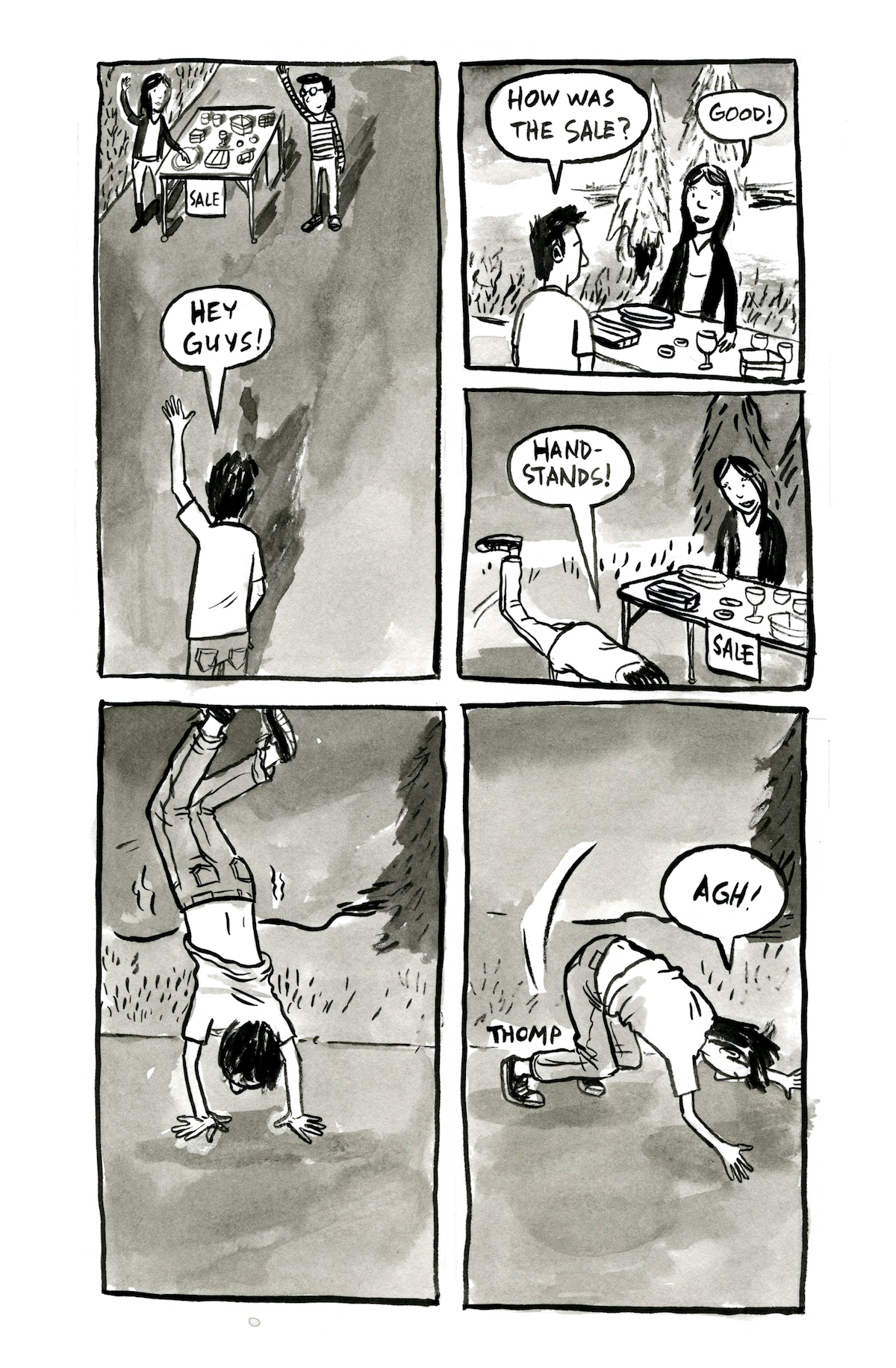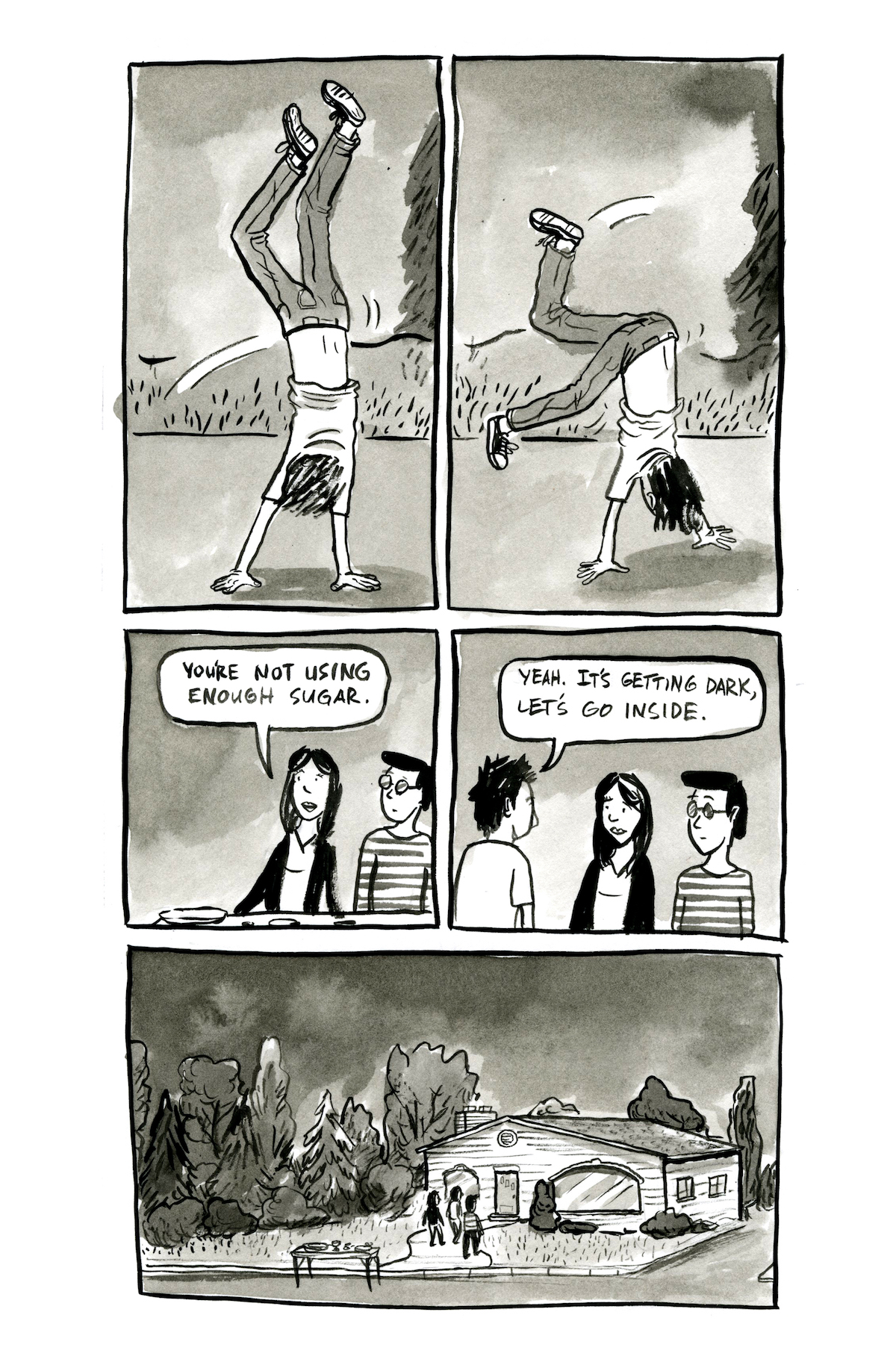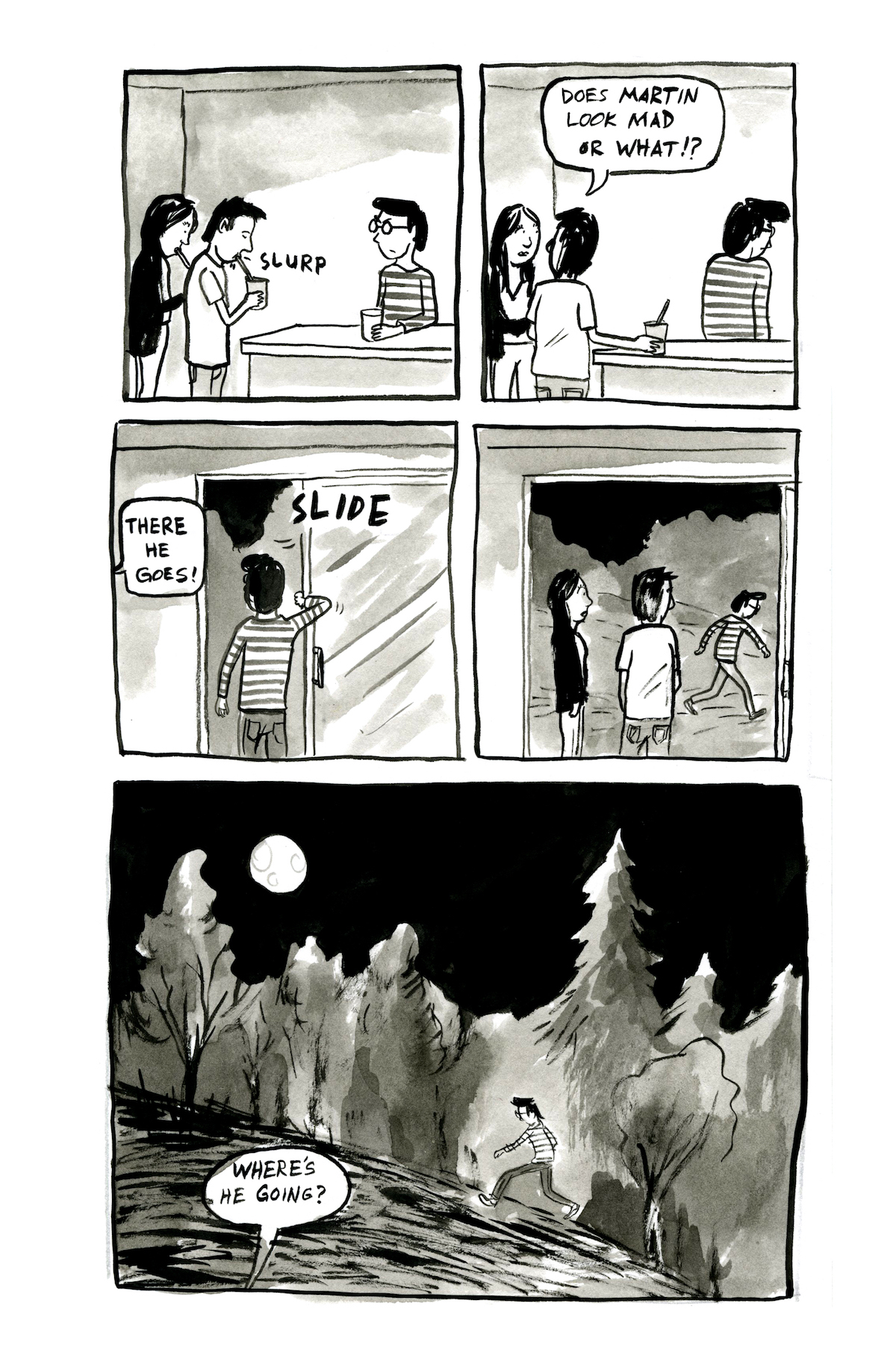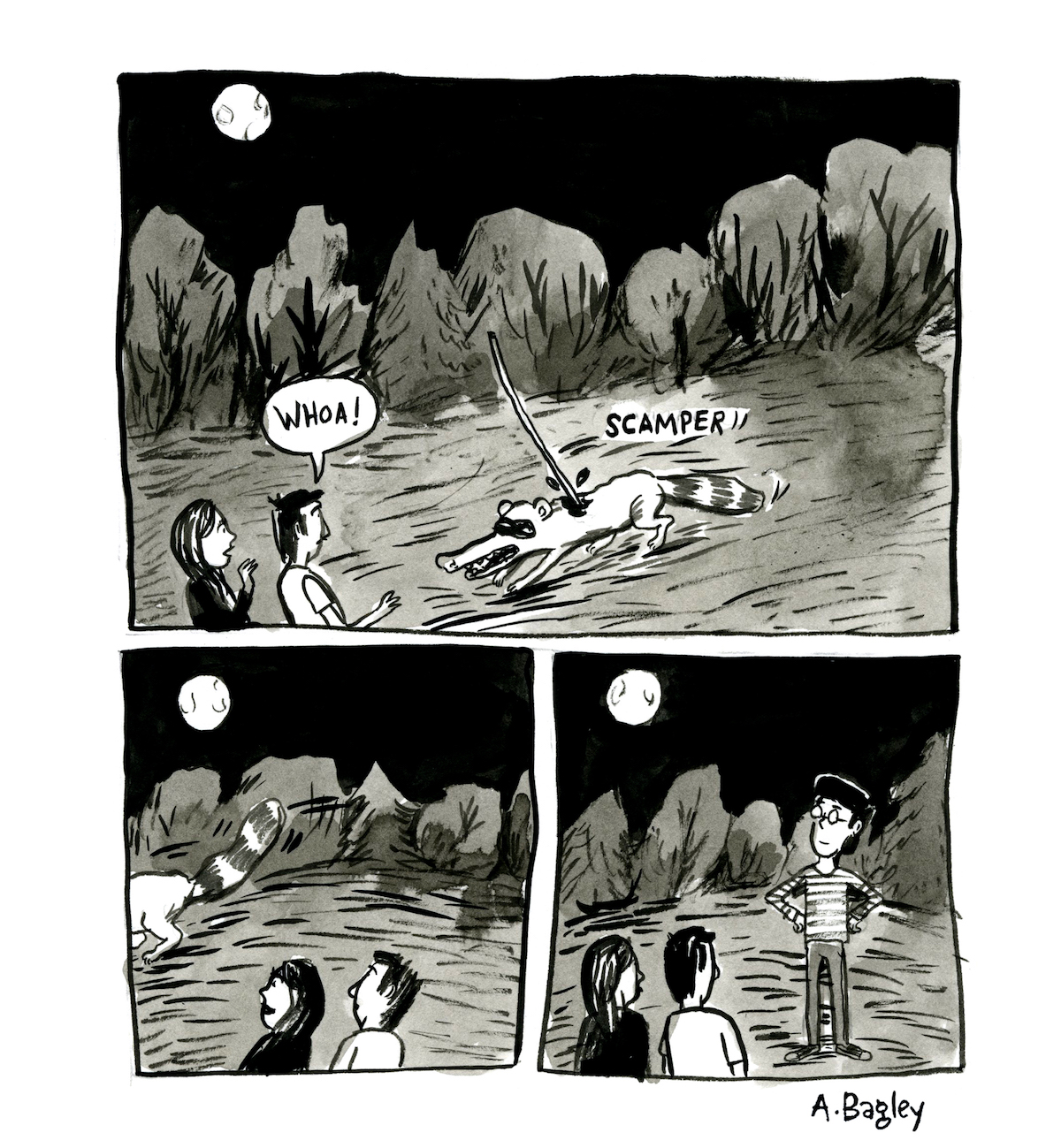Portrait Gallery: Ruth Ozeki
Each week, Christine Larsen creates a new portrait of an author for us. Have any favorites you’d love to see immortalized? Let us know
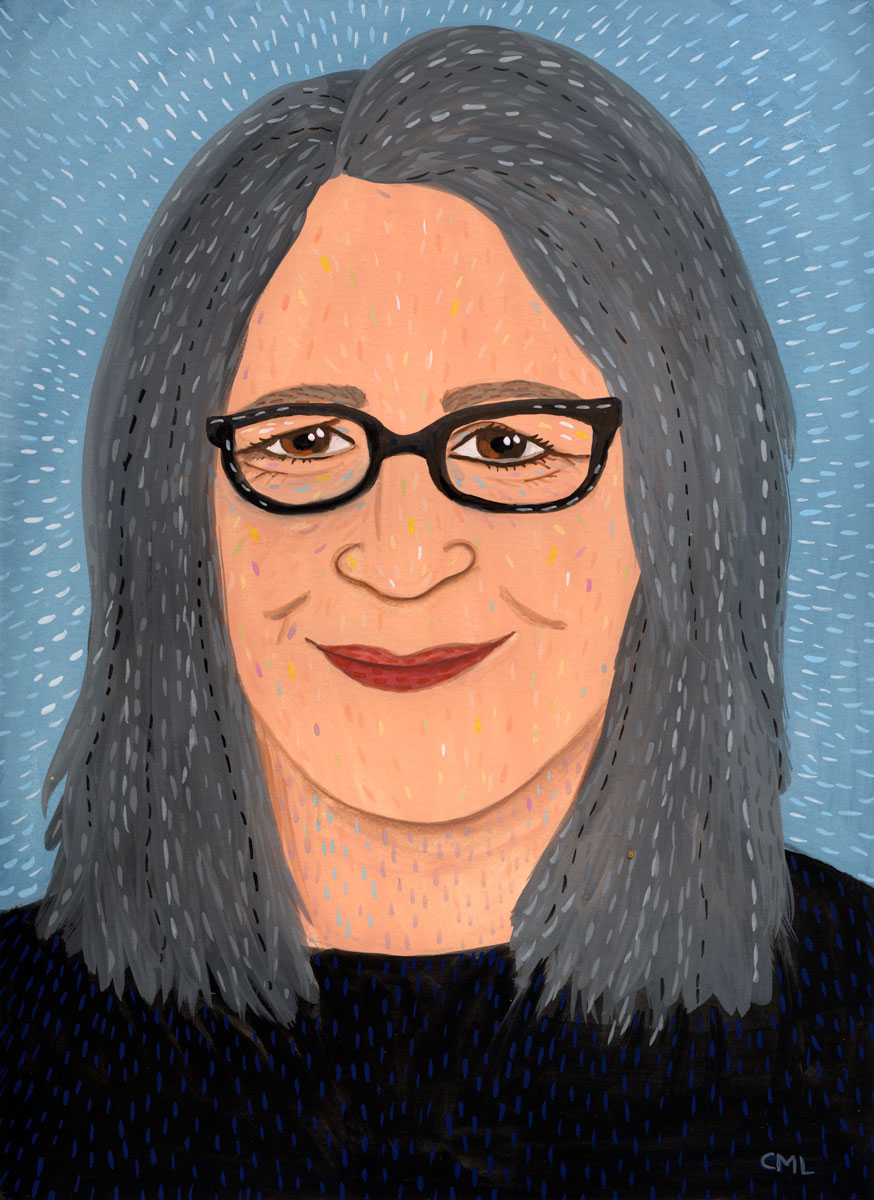
Friday, February 23: “Meditation for Writers” with Ruth Ozeki
This Friday at Washington Hall, author and Zen Buddhist priest Ruth Ozeki will speak on the theme “Meditation for Writers,” and it is a talk that only she could give. She’ll help writers gain the focus that modern technology seeks to steal from them, and the perspective that only a true sense of timelessness can offer.
Washington Hall, 153 14th Ave, http://washingtonhall.org, 8 pm, $15.
Criminal Fiction: All in the family
Every month, Daneet Steffens uncovers the latest goings on in mystery, suspense, and crime fiction. See previous columns on the Criminal Fiction archive page
Including both James Lee Burke and Alafair Burke in this column got me thinking of other mystery-writing family ties. Whether it’s a collaborative, mother-offspring effort a la Mary Higgins Clark-Carol Higgins Clark , PJ Tracy (see also this), and Charles Todd or an all-in-the-family business, it’s dead good fun to imagine those in-the-writing-studio and dinner-table conversations.
Reading around: new titles on the crime fiction scene
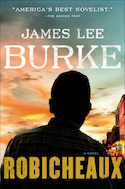
A new Dave Robicheaux novel is always an immersive pleasure. From Robicheaux’s keeps-him-on-his-toes relationship with daughter Alafair and his deep friendship with buddy Clete Purcel to his quasi-homebody existence in Southern Louisiana, a new Robicheaux tale is akin to hanging with a beloved, familiar friend — well, with some violence and criminal activities thrown in for good measure. James Lee Burke’s Robicheaux (Simon & Schuster), shivers with the dastardly deeds of nefarious no-goodniks as well as with the possibility that Robicheaux may have mishandled a deadly situation. The choice range of supporting characters come thick and fast, as do the unwavering stabs at the hideous levels of corruption in Louisiana politics. One of my favorites among a multitude of compassionate touches: a singular Clete-related reference to the Just Men of Jewish legend.
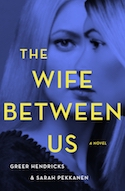
The Wife Between Us (St. Martin’s), a tidy and terrifically twisty psychological thriller, is also an impressive, double-handed effort: Greer Hendricks, a former book editor, and Sarah Pekkanen, a best-selling novelist and former investigative journalist, have put their literary heads together, creating an enjoyably electrifying, page-turning ride with cannily-chosen details. These days it takes a little something extra to offer up an intriguing novel of domestic suspense, and this book has it in spades. Oh yes.
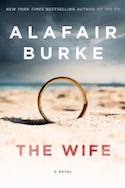
Alafair Burke’s The Wife (Harper) features a critical cameo by Olivia Randall, the intriguing protagonist of Burke’s 2017 mystery The Ex, but this whiplash-inducing tale — in a good way — belongs wholeheartedly to Angela Powell, a woman with everything she ever wanted, including marriage, motherhood, and a fairly high-falutin’ Manhattan lifestyle. But not-so-behind-the-scenes, a perfect storm of sexual harassment accusations against her husband and past deeds long since swept under the proverbial rug may be coming home to roost. While utilising fun pop culture references – that unforgettable eyelid moment in Raiders of the Lost Ark, an arch Hunger Games comment — Burke maintains an even hand here, nicely sprinkled with the multiple deftly-doled surprises up her cavernous sleeve.
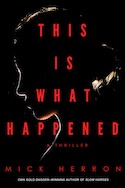
I’m a massive fan of Mick Herron’s excellent British spy/Slough House series. This Is What Happened (Soho), a standalone thriller, draws on his incisive spymaster knowledge as well as other imaginative forays, and uses the mean streets of contemporary London to their utmost advantage. Protagonist Maggie Barnes – independent, smart, and ever-so-slightly emotionally vulnerable – is the perfect recruitment target for certain MI5 missions and she accepts her destiny with alacrity. It’s what happens next that leads deep into a startling and engrossing rabbit hole.
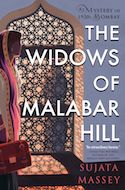
The wonderful Widows of Malabar Hill by Sujata Massey (Soho) is the first in an enticing new series: Parsi Preveen Mistry has joined her father’s law firm in 1920s Bombay, a position fraught with challenges, including her attempt to attend law classes at the Government Law School. When someone turns up dead at the secretive home of one of Preveen’s father’s clients, she’s handed an unusual opportunity: the wives of the household live in strict purdah, but, as a woman, Preveen can speak with them directly. A rich blend of history and fiction, Widows brings historical Bombay to vibrant life in this engaging mystery.
The Quintessential Interview: Meg Gardiner
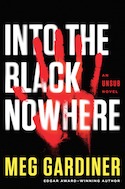
Austin-based Meg Gardiner had already published 12 terrific mysteries when she kicked off her chilling new series last year with the unnerving UNSUB, introducing Bay Area detective Caitlin Hendrix and a serial baddie known as the Prophet. In Hendrix’s second outing, she’s testing her mettle as a rookie FBI agent with the organization’s Behavioral Analysis Unit, but the killer she’s chasing is no less creepy than her previous nemesis. On a more personal level, she’s now balancing a bi-coastal relationship with bomb-explosive-specialist boyfriend, Sean Rawlins.
What or who are your top five writing inspirations?
Families. The seven deadly sins. The shadowed depths of the human mind. The hero’s journey. Sue Grafton.
Most of my top five are source material. But Grafton’s books both thrilled me and showed me there was a place for women writing modern crime fiction. She inspired me to write my own novels.
Top five places to write?
- My office, when the red-shouldered hawk is perched in the trees outside, eyeing me.
- A coffee shop buzzing with white noise and caffeine.
- My kitchen table, sixty minutes before the school bus drops the kids off. When the clock is ticking, I can write like a maniac.
- An airplane, with a printout and a pencil. Never a pen. Not since my rollerball blew up on that Southwest flight. Folks: ink and altitude don’t mix.
- Behind the backs of my eyes as I wake up in the morning. When the world is still and dreams are fresh, answers to problems in the story reveal themselves.
Top five favorite authors?
Stephen King, James Lee Burke, Sara Paretsky, Don DeLillo, Elmore Leonard.
Top five tunes to write to?
- “Mr. Brightside,” The Killers
- “Megalomaniac,” Incubus
- “Wheels,” Foo Fighters
- “Like the Way I Do,” Melissa Etheridge
- “Stormy Haze,” Ray Prim
Top five hometown spots?
Torchy’s Tacos. The Half Step on Rainey Street, when the band’s playing jazz. The LBJ Museum. The hiking trail around Lady Bird Lake. Book People.
Thursday Comics Hangover: Politics is best served cold
Last month, Drawn and Quarterly published the new English translation of Swedish cartoonist Anneli Furmark's comic Red Winters. Though the book is set in 1970s Sweden, it feels newly relevant for a politically charged America in 2018.
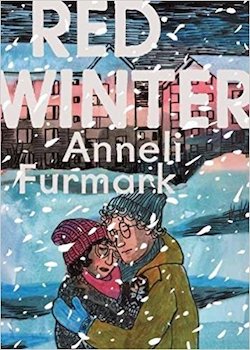
Their political differences don't matter to Siv and Ulrik, but they do matter to everyone else. As the community discusses Siv's infidelity, the relationship becomes a partisan football, used to question the couple's commitment to their respective causes. The communists suspect Ulrik of selling out; neighbors wonder if Siv is about to turn radical.
Of course, every affair is political. Siv and Ulrik's decisions don't only affect them. Red Winter brilliantly displays the impact of the affair on everyone in the community by continuously changing perspectives: one chapter focuses on Siv's daughter while another centers on Ulrik's nosy roommate. Siv's husband starts to realize something is wrong. Everyone is, ultimately, a partisan.
Anyone who's lived through Seattle's endlessly glum winters will find something to recognize in Furmark's gorgeous illustrations. A cold and dark winter - snowier than here, obviously - permeates every page, and Furmark's orange-and-blue color palette perfectly portrays the whipsaw winter alternation between cozy warmth and brutal frigidity. You can feel the cold of this book in your bones.
The characters, too, are instantly recognizable in just a handful of lines. Even as they strip off layers when they head indoors and swaddle themselves in protective winter clothing when they leave the house, you always know exactly who you're looking at. Furmark's biography describes her as "One of the most important comics artists in Sweden," and Red Winter is the first full-length work to be translated into English. Let's hope it's not the last.
Mail Call for February 21, 2018
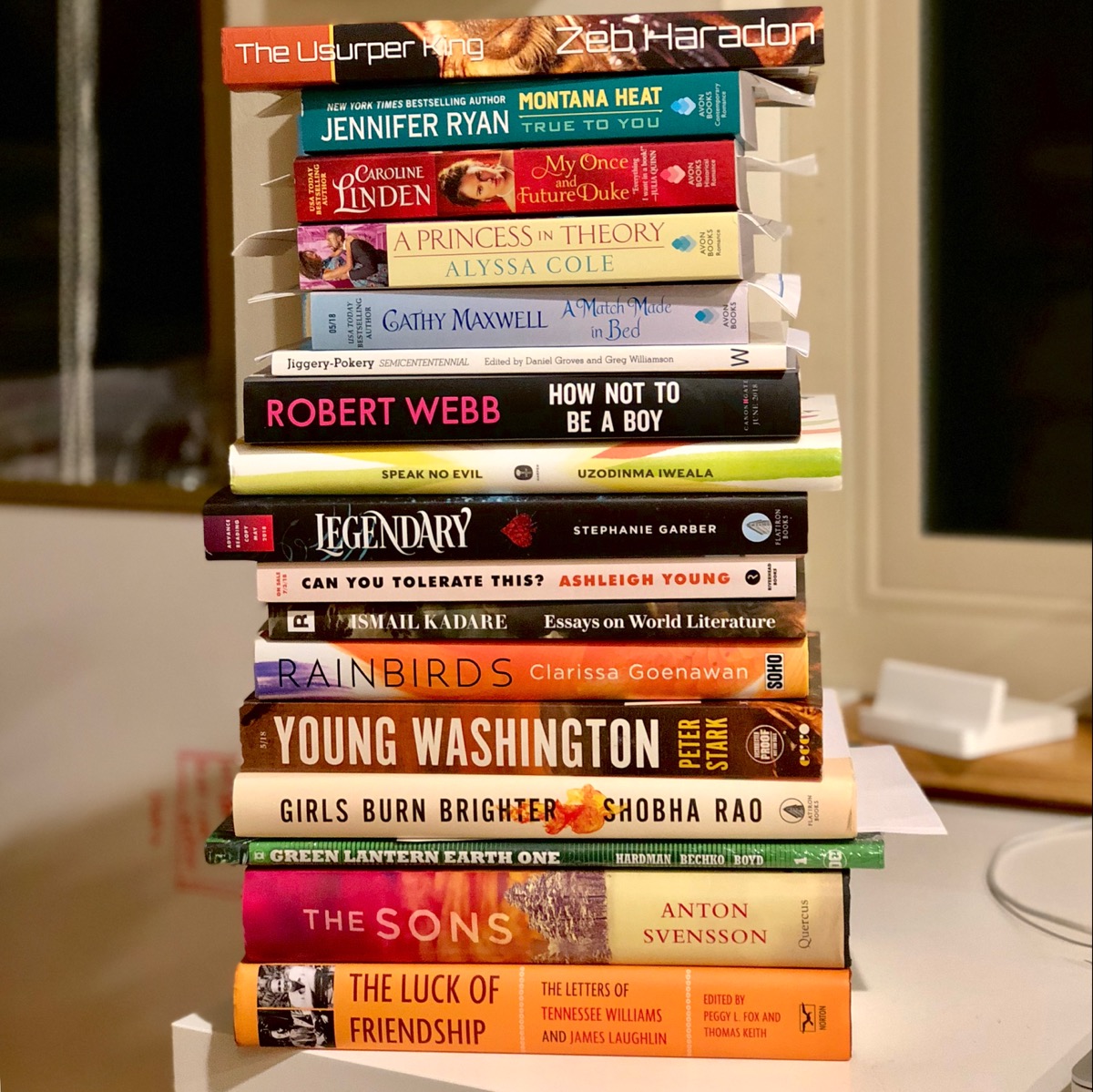
The Seattle Review of Books is currently accepting pitches for reviews. We’d love to hear from you — maybe on one of the books shown here, or another book you’re passionate about. Wondering what and how? Here’s what we’re looking for and how to pitch us.
Book News Roundup: Elliott Bay Book Company goes to the airport
Buried in this South Sound Magazine story about new additions to SeaTac International Airport by Kirsten Abel, there's a piece of news that Seattle Review of Books readers will be especially interested to hear. A ton of local restaurants are opening in SeaTac over the next few years, but SeaTac will also be home to an outpost of the Elliott Bay Book Company. This move has a local precedent, of course: Portland indie bookstore Powell's has an airport outpost, too. I'm incredibly excited to see bookseller-approved selections at SeaTac, rather than the usual Hudson News monotony.
Yesterday, I chatted on Facebook Live with Evergrey cofounder Monica Guzman about three spring books I'm looking forward to reading over the next three months.
West Seattle Blog's Tracy Record wrote an excellent post about Pulitzer Prizewinning novelist Colson Whitehead's visit to a West Seattle high school.
We're very excited to hear that civil rights legend Representative John Lewis has announced a second comics trilogy to pair with his March series. The new trilogy, about his life in politics, is cleverly titled Run.
Fuck off forever, Milo.
The beautiful strange
Published February 21, 2018, at 12:00pm
Fans of Jeff VanderMeer's Southern Reach trilogy are waiting with anticipation (and apprehension) for the February 23 release of Annihilation. Is the New Weird too weird for the big screen? Or is this the genre our screwed-up historical moment needs most?
"Although [Seattle] has so many things that it needs to work on, there is beauty in it as well."
"I started writing poetry in eighth grade," our February Poet in Residence, Azura Tyabji, tells me over the phone. She'd always considered herself a writer - she wrote and assembled her own books as a child, and she participated in the school paper as soon as she could - but "I never really considered myself a poet." It was an assignment to read a poem in a student showcase that inspired her. She credits her language arts teachers for "validating that yes, what I was writing was, in fact, poetry, and that it deserved an audience."
Tyabji continued to write poetry, but a couple years after her first reading, she became involved with the local writing organization Youth Speaks, and then everything became clear. At first, she attended a poetry slam and she found the competitive atmosphere to be too intimidating to participate, "but then I went to an open mic and it was one of the most welcoming, beautiful, nurturing communities that I'd ever witnessed. And I decided I want to join this beautiful community and give back to it and be a part of it." She's been a part of Youth Speaks ever since.
Ask Tyabji what poets she's reading right now and she enthusiastically supplies a list of names. "Locally, Tara Hardy is someone that I've been reading again and again and again, and I just want to see Anastacia-Renee speak at the Seattle Public Library." The two poets inspire Tyabji as performers, as writers, and as people. "I'm just in awe of how they craft their imagery and I think that they both really have this whimsical style that I hope to learn from," she says. And she reads the work of Washington State Poet Laureate Claudia Castro Luna "whenever I want to be inspired to observe my city."
Nationally, Tyabji is a big fan of spoken word artist Olivia Gatwood, whose 2017 collection New American Best Friend is a big influence on her work. "She writes very intimately about girlhood - she writes about period panties, and she has a poem called 'Ode to my Bitch Face.' She's so bold in how she describes and prioritizes girls." From Gatwood, Tyabji is learning how to "uplift women and girls to fight against shame."
Tyabji is a writer on the verge of a big shift. She's graduating high school this June, and she's staying in Seattle for her gap year before heading to a college that is "probably out of state." Is she concerned about leaving her community behind? "I'll be really sad to let Youth Speaks Seattle go when it is my time to leave," she says. "But I know that the community here will keep growing and keep preserving itself and also find new paths, and I can always come back and visit."
She has no doubt that she'll be able to find a community of poets no matter where she goes. "What I've learned for myself is that I can't write poetry alone. I'm always absorbing what other people have taught me, and I think that's how we all work as poets: absorbing and is being influenced by each other," Tyabji says.
But no matter where she ends up, Tyabji knows where her roots are. "I consider myself a Seattle poet," she says. "Not just because I was born here and grew up here, but because I try to write about my city, especially with how it's changing, how it's being transformed into a city that's not necessarily friendly to the same people that have lived here for a long time," both through gentrification and institutional racism.
"But I'm trying to challenge myself to write about what I love about the city. Yesterday I just watched a poem by Laura 'Piece' Kelly called 'Central District.'," Tyabji says. "She writes so lovingly about her community in the Central District and about growing up in Seattle, and that's something I want to challenge myself to remember as well: although the city has so many things that it needs to work on, there is beauty in it as well."
Tyabji sets a lot of goals for herself. She wants to do writing residencies, and publish a chapbook, and learn how to teach poetry. She's currently starting to co-teach a class on slam poetry at her high school, and she says "I can't wait to see what I'll discover about my own work when I teach others."
When Tyabji reads her own work, she radiates an air of confidence that many poets twice her age will never be able to muster. What's her secret? "When I'm preparing to share a poem for the first time, I really sit down with what I have written and I read it over - in my head first and then out loud."
As her own first audience, she says, "I read the poem until I really am confident that this piece brings me joy." And it's important "when you're sharing your work with other people to go somewhere where you're surrounded by people that love you unconditionally. Find your community - even if it's small. I'm really blessed to have the Youth Speaks community, and we really give love to every poet."
Tyabji likes to remember that all poets have anxiety about their work. "We're never going to get to a point where we're not anxious, where we're a hundred percent confident about anything. I could choose to despair over that fact, or I can use it as a motivator," she says.
"I think it's great that I will never be perfect," Tyabji says. "I think I can learn so much from that. I can always keep challenging myself."
Not really a comic book
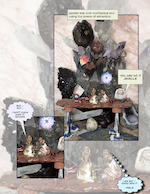
Sponsors like Kevin Marshall make the Seattle Review of Books possible. Did you know you could sponsor us, as well? If you have a book, event, or opportunity you’d like to get in front of our readers, reserve your dates now.
Around the block
I've said for years that I don't believe in writer's block. I believe writing to be a craft more than an art, and I think the only way to cure a problem with writing is to sit down and work through it by writing - a lot. Inspiration is cheap, and words are entirely free. Too many people use writer's block as a convenient excuse to explain away their fears, or to undercut their own ambition. This is not to say that writing is easy - you need the privilege of time, and you have to commit to the time, and you have to read all the time - but it is to say that writing has nothing to do with muses.
So when I sat down on Sunday night at Benaroya Hall to talk with Fran Lebowitz, I had to ask her about writer's block. Lebowitz's decades-long case of writer's block is arguably the most famous creative blockade since Coleridge was interrupted while writing "Kubla Khan."
The question, as I put it, was inelegant: I told her I didn't believe in writer's block and I wanted her to persuade me that it existed. That gave Lebowitz the option to use herself as an example. She said if she didn't have writer's block, she wouldn't be at Benaroya Hall on a speaking tour. Because she can't write, she suggested, she has to travel to cities being witty as a public speaker for her supper. If she could write, she'd be at home - writing.
I tried a different tack: is writing, for Lebowitz, a pursuit of perfection? Yes, she affirmed. For her, she was only interested in writing if she could write perfectly.
Lebowitz started out by writing a column, and I started out writing for a weekly newspaper. Didn't those early relentless deadlines teach her the same thing they taught me - that no writing could ever be truly perfect, that ultimately you just have to be okay with letting it go into the world? No, Lebowitz disagreed. Deadlines worked for her column, back in the day, but she seemed to expect more of herself now.
Some might argue that there's no such thing as a perfect sentence. I tend to disagree; Vladimir Nabokov wrote a shelf full of books that are as close to perfect as anything I've witnessed in my life. And that's the vision that Lebowitz is pursuing - the perfection of Truman Capote, of Harper Lee. The kind of perfection that demands a monastic dedication.
Nobody will ever accuse me of writing a perfect sentence. And the difference between Lebowitz's writing and my own is not unlike the difference between an airplane and a tricycle. So it's presumptuous of me to compare my own experience to hers. But I believe her, now: Lebowitz's writer's block is as real as her custom-made cowboy boots. She's blocked by her own expectations, and those expectations are confounding her endless pursuit of perfection.
Room for everything
Published February 20, 2018, at 12:01pm
Chandler Klang Smith's new book crams everything it can inside itself, from Batman to Jane Austen to dystopian fiction to dragons. Are you ready for the first big everything novel of 2018?
Bunker
Police Chief Kathleen O’Toole says,
“My hope is this will be the community’s police station”and every inch of black girl resistance in me becomes a tremor becomes palpitation of heart and earth,
a bullet in barrel,
Earth’s crust eager to rift itself into a beast that breathes fire.Experts say,
a .9 earthquake will hit Seattle within the century.
Police union says it needs a new facility able to endure eventual catastrophe and I think
if cops need building material,
there’s nothing more able to endure fission than a black or brown body.There’s nothing that holds up guilt, greed, and excess more than a back that is used to being broken,
but I’m glad
I get a seat at a table I’ve set
A community space a floor above a shooting range:
a court to practice the de-escalation technique of killing people who look like my family Thank you, officer, for this concession.Capital will never become full enough to not steal the fruits of our labor. Will never sacrifice beyond what it can get away with spitting up. Capital
harvests stolen crop
until mouth twists into gallant smile, blood on leaves and blood at root Strange
FruitO’Toole wants the new precinct host a farmers market.
What can grow in a fortress besides a pedestal to hang a noose? What good is a community that bonds over lynching?
Is this what a safe city looks like?
Is this
Emerald City progressive showing us the man behind the curtain and expecting us to pay no mind?Government ain't the wizard we hoped
but a coward pretending to be better than he is
Is this the fraud I'm expected to call progressive?
Is this the shooting range I am expected to call my community?
Tell me,
O’Toole
What's a new precinct to Oscar Perez’s grieving family?
What's a new bunker to the 10,000 homeless people in Seattle besides another place they can't live in?
This is excessive force
of the most insidious kindI don't know which will hurt me first:
a building collapse or a cop mistaking my mother’s body for a weapon Either way
I know whose lives matter in this city
and it's not black lives.
Seattle is prepared for us to die
Seattle making a refuge for people who already get away with killing us, too.Insurrection will be the next major disaster this city faces
Will resurface all the lies and empty promises it was told
Pulse from the streets up, radiate the heat of magma Molotov and bitter history, no longer latent and cowering,
but surging, dangerous, and revolutionary.We will be hammer to the coffin of every cruel and fragile thing that has wronged us and tool to every dream we want to build in its place
A table where capitalism is not welcome
A city my mother can feel safe in
A city where all lives actually matter
Where hands reach out to hold mine instead of to the gun in its holsterI know
it's hard to stay hopeful
in times where death seems to lurk around every corner But we are unstoppable
and another world is growing within us
I am prepared to fight
for a community
That is real
Mail Call for February 19, 2018

The Seattle Review of Books is currently accepting pitches for reviews. We’d love to hear from you — maybe on one of the books shown here, or another book you’re passionate about. Wondering what and how? Here’s what we’re looking for and how to pitch us.
Your Week in Readings: The best literary events from February 19th - 25th
Monday, February 19: Densho Day Remembrance
Noted patriot and memoirist Khizr Khan leads a day of remembrance for all the Japanese-Americans who fought and protested and were held in camps during World War II. There will also be a documentary screening and live music. Seattle Center Fisher Pavillion, 305 Harrison St, 2 pm, free.Tuesday, February 20: The Silence of Vanishing Things Reading
Is “an over-reliance on scientific terminology and concepts…quietly undermining the human ability to come to grips with the climate crisis?” That seems like a complicated thesis to support. The Silence of Vanishing Things is an anthology of (mostly) poems about the battle to address and fix climate change. Third Place Books Ravenna, 6504 20th Ave NE, 525-2347 http://thirdplacebooks.com, 7 pm, free.Wednesday, February 21: Close Encounters with Humankind Reading
Sang-Hee Lee discusses “humanity's dawn and evolution” in her book Close Encounters with Humankind. The Korean author will discuss her research into humanity’s beginnings and the answers to some of the biggest questions about evolution. Greenwood Senior Center 525 N 85th St, 7:30 pm, free.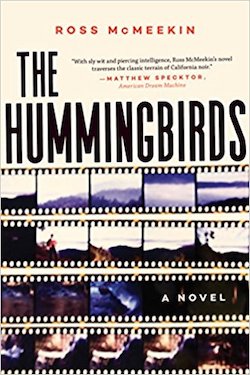
Thursday, February 22: The Hummingbirds Reading
Seattle author Ross McMeekin takes his debut novel north of downtown. The Hummingbirds is about Los Angeles, real estate, adultery, and beautiful people. Third Place Books Ravenna, 6504 20th Ave NE, 525-2347 http://thirdplacebooks.com, 7 pm, free.Friday, February 23: “Meditation for Writers” with Ruth Ozeki
See our Event of the Week column for more details. Washington Hall, 153 14th Ave, http://washingtonhall.org, 8 pm, $15.Saturday, February 24: Soap for the Dogs x She Who Has No Master(s)
On March 1st, Gramma Poetry will publish Stacey Tran's new book of poetry, Soap for the Dogs. To celebrate the release of the upcoming title, Tran will be joined by writes who participate in She Who Has No Master(s), "a collective of writers and artists elucidating the Vietnamese 'feminine' - as touched by war, history, heritage, mythology, displacement, refugee exodus, violence, migration, and personal experience." Tea will be served, and three readers will perform poetry. Mount Analogue, 300 S Washington St, Unit Z, http://www.mount-analogue.com/current/, 7 pm, free.Sunday, February 25: Look Reading
In her poetry book titled Look, Solmaz Sharif writes poems that plumb the depth of the “US Department of Defense’s Dictionary of Military and Associated Terms” to create art. This event is a discussion of the book; the author will not be in attendance. Open Books, 2414 N. 45th St, 633-0811, http://openpoetrybooks.com, 4:30 pm, free.Literary Event of the Week: "Meditation for Writers" at Washington Hall
British Columbia author Ruth Ozeki's majestic 2013 novel A Tale for the Time Being imagined a global perspective on the Northwest, pinning together the Fukushima meltdown with our coastline on the other side of the world. She is a vocal supporter of the amazing Hedgebrook writers residency for women. And she's a natural teacher who has guided new generations to the pleasures and challenges of writing fiction.
Ozeki is also a Zen Buddhist priest-ordained in 2010-and that informs her work more than any single region or theme ever could. Zen Buddhism enables Ozeki to span the divide of time in her work in novel ways, exploding a moment out into an eternity and back again.
This Friday at Washington Hall, Ozeki will speak on the theme "Meditation for Writers," and it is a talk that only she could give. She'll help writers gain the focus that modern technology seeks to steal from them, and the perspective that only a true sense of timelessness can offer.
Here's a video of Ozeki talking on the topic of meditation:
So, look. Maybe you're thinking this is religious bunk, or just feel-good hooey. If so, that's okay. This isn't for you. But if you can't get through a paragraph without checking Twitter lately, I'd advise you to attend this talk. As anyone who's had a burst of inspiration in a shower can tell you, sometimes the very best thing you can focus on in pursuit of fiction is nothing at all.
Washington Hall, 153 14th Ave, http://washingtonhall.org, 8 pm, $15.
The Sunday Post for February 18, 2018
Each week, the Sunday Post highlights a few articles we enjoyed this week, good for consumption over a cup of coffee (or tea, if that's your pleasure). Settle in for a while; we saved you a seat. You can also look through the archives.
The Great Stink
Laurie Penny somehow manages to be deeply compassionate toward men who treat women badly, without surrending a single ounce of her righteous, blazing fury. In this piece, she explores what men’s feelings require of women during the #metoo moment — and how the kneejerk instinct to protect and mend may be just as damaging as the impulse to rage and reject.
Self-hatred makes people selfish. It deserves compassion, but not indulgence. Women — and I’m sorry to have to break this to you — are not put on this earth to make men feel better about how inherently awful they are. Most of us would prefer the men in our lives to stop wallowing and get on with being a little bit more considerate than they were yesterday, because that is what it means to grow the fuck up.
So no, I don’t hate men. I hate how brittle and fragile modern masculinity is; how it reacts to any perceived threat by lashing out and shutting down. I hate how part of our worn-out script of maleness is by definition resistant not just to change, but even to the thought of change, and how tightly swaddled the whole thing is in shame and silence.
The Final, Terrible Voyage of the Nautilus
Imagine you’re a guy with the means and desire to build a crazy-ass high-tech submarine, and you do; and you’re also a guy with the means and desire to lure a freelance journalist on board with the promise of a story, torture and kill her, and you do; and then you sink your incredibly expensive high-tech submarine to try to cover the murder.
Now imagine you’re another journalist, a friend of the dead woman (stay with me, this is going somewhere), and you investigate your friend’s death and write about it, including how even being dismembered might be something that you were “asking for.”
That’s this, by May Jeong. Read it.
In the days after she disappeared, I heard people ask questions that betrayed a misunderstanding about reporting — couldn’t she have done the interview over the phone? — and casual sexism — why was she there alone so late? On nights when I couldn’t sleep, I would end up on internet chat rooms where the comments sections filled me with rage: “She is a woman — how could she go alone with a man she does not know?” And: “She had skirt and pantyhose—how could she egg on a poor uncle in that way.”
On Writing For Love Or Money
Alexander Chee’s latest newsletter contains a truly excellent manifesto about why writers should expect, and ask, to be paid. The fact that there’s social stigma around this is nuts. If you’re afraid that asking for money means you aren’t a “real writer,” read this and boldly go forth into a new and shame-free world.
And then yesterday morning, I received an email from someone assisting in the editing an anthology. She had made the assumption that my silence in response to her and her co-editor's last email was due to the fact that they can't afford to pay anyone, and so she wrote to me, acting as if I was snubbing them because of the money issue, and quoting from this essay at BuzzFeed back to me. I had written there that you should write for money and love both but money more than love. And she seemed to think it was a sign I was a callow creature hell-bent only on profits, and not someone who had so often gone broke because of writing for love.
Billionaires gone wild
Inside baseball, but fascinating: Alex Pareene dissects the role billionaires play in sustaining, and thus shaping, the media landscape. Read this even if you think you don’t care; by the end, you’ll care very much.
What’s happening to the press is reflective of the broader transformation of our society. Rule by supposedly benevolent technocratic elites is giving way — in large part due to the fecklessness of those technocrats — to straight plutocracy. And really, that only makes sense in an era in which everyone feels like their lives are, in important and fundamental ways, in thrall to the whims of a few mega-rich people. Our cities promise to remake themselves to please Bezos. A few GOP donors threaten to close their checkbooks, and the entire federal tax code is sloppily rewritten. Chris Hughes sneezes, and The New Republic catches a cold.
The Good Room
Frank Chimero brings a designer’s sensibility to the question of the kind of rooms we choose to inhabit, when we choose to inhabit the internet. If we don’t like the ones we’ve made, why not imagine new rooms — and go live there? Despite its starry-eyed start in the New York Public Library, this is a solid piece about the commercialization of digital community space, and a reminder that we’re not at the mercy of the technology we use. Quite the opposite.
Facebook, Google, Apple, and Amazon aren’t going anywhere at this point — nor should we expect them to — so it’s best to recalibrate the digital experience by increasing the footprint and mindshare of the kinds of cultural and communal value they can’t provide. The web isn’t like Manhattan real estate — if we want something, we can make space for it.
Different measuring sticks are also in order. If commercial networks on the web measure success by reach and profit, cultural endeavors need to see their successes in terms of resonance and significance. This is the new game, one that elevates both the people who make the work and those who see, use, and enjoy it.
(h/t Tim Carmody via Kottke.org. And while we’re on the subject of Jason Kottke, here’s an interview with one of the internet’s best-known renaissance bloggers.)
Whatcha Reading, Alix Christie?
Every week we ask an interesting figure what they're digging into. Have ideas who we should reach out to? Let it fly: info@seattlereviewofbooks.com. Want to read more? Check out the archives.
Alix Christie is a writer and journalist based in London. Her novel Gutenberg's Apprentice (which I absolutely adored) came out in 2014. She's at work on a new novel about her Scots ancestors in the Pacific Northwest.
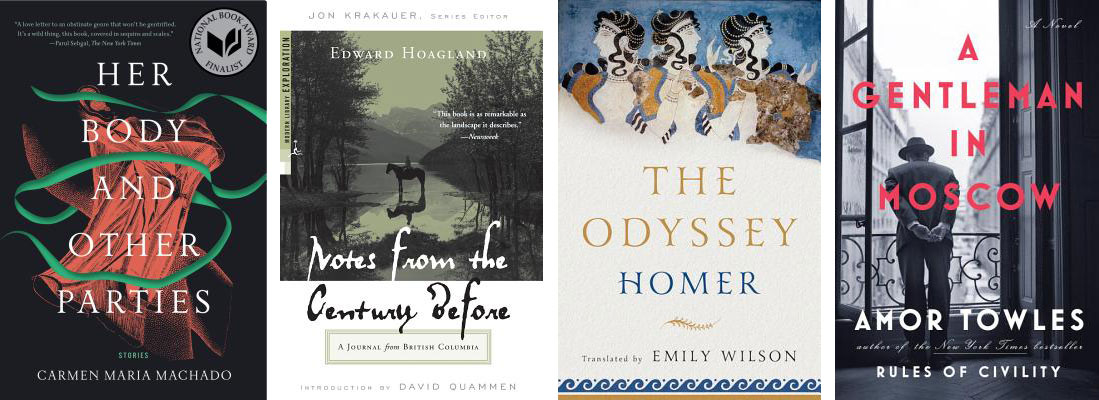
What are you reading now?
Almost finished Her Body & Other Parties by Carmen Maria Machado. These stories are blowing my mind. On the one hand they're visceral, sexy, physical, and on the other fantasmagorically surreal — yet also terrifyingly plausible. Each one is a take on the obliteration of the female body, the violence to which it is constantly prey in this society. Yet they're dreamlike, logical, beguiling—brilliantly devised. I am in awe of her imaginative power and look forward to reading much more.
What did you read last?
A remarkable travelogue, Notes from the Century Before: a Journal from British Columbia by Edward Hoagland, in the Modern Library Exploration Series. It describes a 1966 journey through the roadless B.C. interior east of the Alaska panhandle. I can't remember ever reading such astonishing descriptions of landscape and people. Hoagland has a razor eye and manages to marry physical traits with moral or metaphysical ones: one fellow "has a rather strange biblical face, rather like Lincoln's"; he looks "as though his face were younger underneath the skin than outside." Nor could I have imagined so many different and precise ways to depict rough and turbulent landscape: "The mountains around were like modern war. … Chains of them extended on in laughing, awesome serration to the four skylines, not a hero among them, just a fierce mass of tire irons and short knives." Some of his attitudes are dated, but the man wields absolutely extraordinary prose.
What are you reading next?
It's a toss-up between the first translation by a woman of Homer's The Odyssey and an enjoyable historical novel, in this case A Gentleman in Moscow which a sophisticated reader friend enthusiastically recommends. I admit to not ever having read the Odyssey, but reports of the brilliance and clarity of Emily Wilson's translation convinced me to buy the book. She apparently conveys Homer's women with more insight, and the opening line is a stunner: "Tell me about a complicated man." We're talking 500+ pages though, and my hibernating winter self is sorely tempted by what I am told is Amor Towles' uplifting story of a man with integrity and heart. I'll keep you posted.
The Help Desk: Writing residencies at the end of the world
Every Friday, Cienna Madrid offers solutions to life’s most vexing literary problems. Do you need a book recommendation to send your worst cousin on her birthday? Is it okay to read erotica on public transit? Cienna can help. Send your questions to advice@seattlereviewofbooks.com.
Dear Cienna,
All my friends who’ve done writer residencies swear by them. But they also don’t really have any work to show from their time away. As an aspiring writer with very little free time on her hands, should I be wasting writing time on residency applications? Or is it better to put that time toward, you know, actually writing?
Bea, Interbay
Dear Bea,
A question: how are you gauging your friends' productivity – by word count? – and why is it up to you to judge? Residencies have a lot to offer – for instance, Hedgebrook gives women weeks of uninterrupted time to write and revise alone in the woods (with very limited access to internet), while other organizations like Tin House are more workshop- and group-centered, and can be a great way to network with congenial non-spiders.
Even the process of applying to residencies and workshops, which is a subtle but proactive way of affirming your identity as a writer, can be empowering. It can also be a great exercise in pitching your work, which you eventually will have to do with an agent or 50.
If you don't feel that any of that would be useful to you right now, keep your money in your wallet and spend your time honing your work. But it doesn't hurt to keep your mind and your ears open for opportunities that can strengthen your skills or inspire you.
For instance, this summer I am hosting the first writing residency for doomsday preppers. These brave and paranoid individuals spend much of their free time training for the end of the world, but I feel their storytelling skills use massaging, as they will be the keepers of human history until a new hive of superior beings colonizes our planet and enslaves them as benign pets.
The residency will take place July 20, 2018, unless America is reduced to ash before then. Space is limited but I am happy to send you its GPS coordinates for two cans of vegetables and a mule's weight in ammunition.
Kisses,
Cienna
BONUS QUESTION:
Dear Cienna,
My friend and I are big fans of your column. We look forward to reading it every Friday.
I have a problem, and I kind of know the solution. My friend sometimes ruins books I loan her, and it’s really a bummer because we trade books often. I know I should speak up, but it would make things weird and I like to avoid discomfort as a rule. So I’d like to be passive-aggressive and use your column as a semi-anonymous bulletin board, if that’s okay with you:
Dear friend: PLEASE STOP EATING CURRY WHEN YOU’RE READING BOOKS I LOAN YOU.
Thanks again for fighting the good fight, Cienna.
Joan, Wallingford
Dear Joan,
I am happy to help. If this polite note is not enough to curb her bad habits, use a dry sardine as a bookmark in the next few books your friend lends you until she is forced to broach the topic herself.
Kisses,
Cienna
Portrait Gallery: Octavia at the Pond
Each week, Christine Larsen creates a new portrait of an author for us. Have any favorites you’d love to see immortalized? Let us know
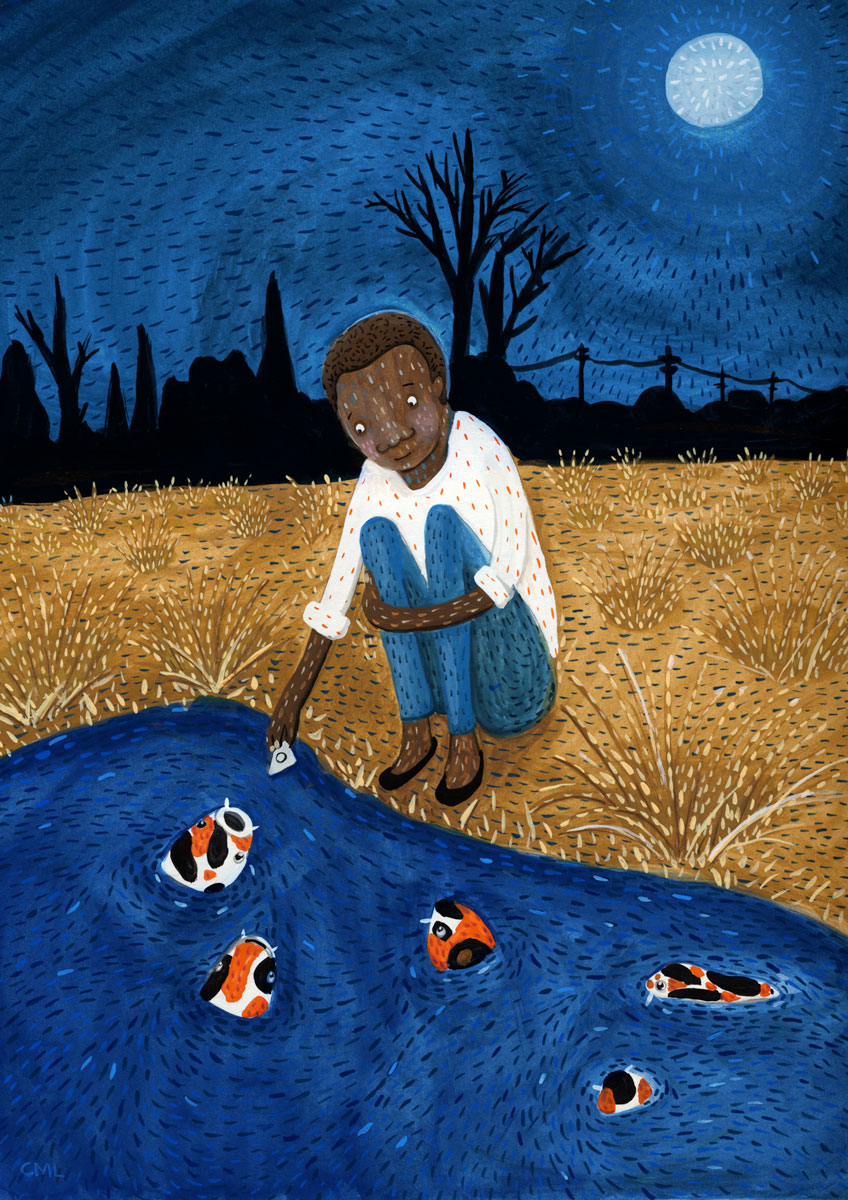
Octavia at the Pond
In a slight departure from format and in celebration of the Literary Event of the Week at Langston Hughes Performing Arts Institute where The Bushwick Book Club will create new music based around Seattle sci-fi giant Octavia Butler’s Parable of the Sower, here is an illustration imagining a young Octavia Butler.
Children's fiction is having its own #MeToo moment
Earlier this week, this happened:
Jay Asher was quietly expelled from the Society of Children’s Book Writers and Illustrators last year after the organization determined that the Thirteen Reasons Why author violated its harassment code, [Entertainment Weekly] has confirmed. The news only became public on Monday, after Asher received scrutiny in the wake of a School Library Journal article on sexual harassment in children’s publishing.
James Dashner, author of the Maze Runner series, has been dropped by his literary agent following sexual-misconduct claims. According to The Hollywood Reporter, Michael W. Bourret confirmed that he would no longer be representing the young-adult novelist. The agent explained, “I couldn’t in good conscience continue working with James, and I let him go yesterday.”
Women are finally speaking out about harassment and sexual misconduct in an industry that, to outsiders, seems as inoccuous as a day at the park.
Here's a piece of advice I hope you'll take to heart in the days ahead: before you follow your instinct to defend an author you love from these charges, take a break from the internet. Stop feeding the always-churning social media machine with your hot takes. Listen to the accusers. Wait to see if more accusers come forward. Really think about what the accusers have to gain from their charges. Do some hard thinking about it, and also consider if your opinion is even necessary to the conversation. There are lots of causes in the world — an infinite number of hills on which you can choose to die — and your time, attention, and energy are limited resources. Make sure you're expending those energies on causes that really matter.
